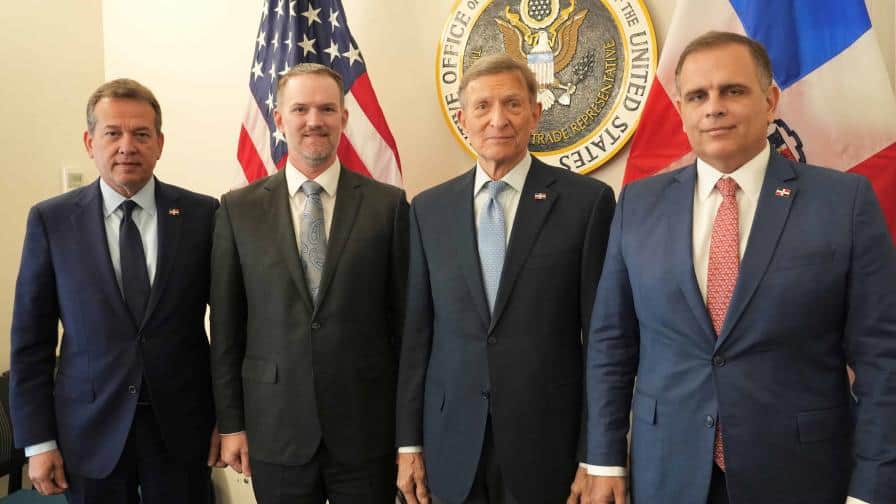Tariffs generate tension between the United States and the Dominican Republic

Despite progress under the Dominican Republic-Central America Free Trade Agreement ( CAFTA-DR ), tensions persist between Washington and Santo Domingo over tariff policies, customs practices, technical regulations, and labor rights.
This information comes from the Office of the United States Trade Representative's (USTR) 2025 Foreign Trade Barriers Report , which analyzes measures that hinder the access of U.S. goods and services to international markets.
Signed in 2004 and progressively implemented since 2006, the DR-CAFTA Agreement has been key to Dominican-US trade . For the Dominican Republic, its entry into force on March 1, 2007, facilitated the duty-free entry of almost all non-agricultural and agricultural products from the US.
However, the definitive elimination of tariffs on sensitive products such as rice, chicken legs, and certain dairy products, scheduled for January 1, 2025, has generated controversy . The Dominican government issued Decree 693-24, which freezes the tariff- free quota for U.S. rice at 23,300 metric tons annually, imposing a 99% tariff on the surplus. Washington has interpreted this measure as a potential violation of its commitments under the treaty.
10%
It is the tariff on certain Dominican products in the U.S. imposed as part of the trade war initiated during the Trump administration.
On the other hand, Dominican exports also face obstacles when entering the United States. Among them is a 10% tariff imposed on certain products, which is part of the trade policy implemented by the Trump administration, which includes different levels of tariffs on imports from all countries. Ten percent represents the lowest threshold within this framework, but it has raised concerns among Dominican business leaders and authorities due to its competitive impact.
In this context, a new round of bilateral negotiations between trade representatives from both countries was held last week in Washington, DC. During the meetings, these sensitive issues were discussed, including tariff-rate quotas, tax reciprocity, and market access conditions.

The report also denounces that American products such as ethanol and cheese face unequal tax burdens compared to their domestic counterparts. While imported ethanol pays a 10% ad valorem tax, a $11 per liter excise tax, and the 18% VAT (Tax on Production and Sale of Goods), domestically produced ethanol is exempt from these taxes. The same is true for imported cheese, which pays VAT, unlike domestic cheese.
In the case of American reinforcing steel (rebar), a testing process in external laboratories is required, a procedure not required for local production. This requirement has increased costs and slowed entry into the Dominican market , despite some specific agreements with exporting companies.
Licenses and customsThe import licensing system continues to be a source of friction. Although the country pledged not to use discretionary criteria, permit issuance remains opaque, affecting the entry of products such as rice, sugar, meat , and vegetables. Customs barriers have also been reported for used vehicles manufactured in the U.S., with importers struggling to prove their preferential origin.
Regarding government procurement, steps have been taken toward greater transparency with the new regulations approved in 2023, but the law that was supposed to consolidate these reforms was not approved by Congress and expired in January of this year. Furthermore, respect for labor rights in the sugar sector continues to be a subject of scrutiny. Since 2013, the U.S. Department of Labor has reported persistent deficiencies regarding working conditions, pay, housing, and documentation for foreign workers.
The Dominican delegation, led by Ministers Víctor Ito- Bisonó (Industry, Commerce, and MSMEs), Roberto Álvarez (Foreign Affairs), and José Manuel Vicente (Finance), traveled to Washington last week to discuss with U.S. officials the global tariff measure announced by the Trump administration.
The Dominican Republic was removed from the Special 301 report's watch list in 2024, following the creation of the National Interministerial Council on Intellectual Property and improvements in institutional coordination. However, challenges such as digital piracy and product counterfeiting persist.
Almost twenty years after its entry into force, the DR-CAFTA faces an increasingly adverse reality. The protectionist trade policy implemented by the Trump administration has imposed new tariffs on Dominican exports and weakened the principle of free trade that gave rise to the agreement.
These measures, coupled with unilateral decisions such as the freezing of quotas or the unequal treatment of imported products, call into question the agreement's real validity and its ability to continue governing trade relations between the two countries. The negotiations held this week in Washington could be the last opportunity to redefine a more balanced and sustainable trade framework before the DR-CAFTA agreement is relegated to a formality without any concrete effects.
TOPICS -
Diariolibre





